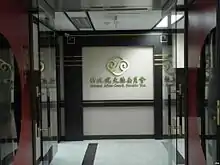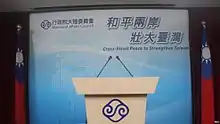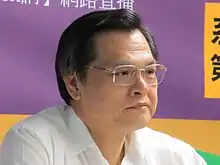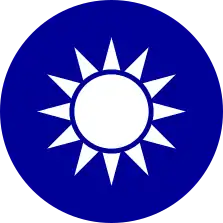Mainland Affairs Council
The Mainland Affairs Council (MAC) is a cabinet-level administrative agency under the Executive Yuan of the Republic of China in Taiwan.
| 大陸委員會 Dàlù Wěiyuánhuì (Mandarin) Thai-liu̍k Vî-yèn-fi (Hakka) | |
 | |
| Agency overview | |
|---|---|
| Formed | August 1988 (as Inter-Agency Mainland Affairs Committee) 28 January 1991 (as MAC)[1] |
| Jurisdiction | Republic of China |
| Headquarters | Zhongzheng, Taipei |
| Ministers responsible |
|
| Parent agency | Executive Yuan |
| Website | www.mac.gov.tw |
| Mainland Affairs Council | |||||||||||||||||
|---|---|---|---|---|---|---|---|---|---|---|---|---|---|---|---|---|---|
| Traditional Chinese | 大陸委員會 | ||||||||||||||||
| Simplified Chinese | 大陆委员会 | ||||||||||||||||
| Literal meaning | Mainland Committee | ||||||||||||||||
| |||||||||||||||||
The MAC is responsible for the planning, development, and implementation of the cross-strait relations policy which targets mainland China, Hong Kong and Macau.[2]
The MAC's counterpart body in the People's Republic of China is the Taiwan Affairs Office. Both states officially claim each other's territory, however the Republic of China controls only Taiwan and surrounding islands, and therefore is usually known as "Taiwan", sometimes referred to as the "Free Area" of the Republic of China by the Constitution of the Republic of China. The People's Republic of China controls mainland China as well as Hong Kong, Macau, Hainan, and other islands and is therefore usually known simply as "China". Therefore, the affairs related to the PRC belongs to the MAC, not the Ministry of Foreign Affairs.
The Mainland Affairs Council is administered by a cabinet level Minister. The current Minister is Chen Ming-tong.
The council plays an important role in setting policy and development of cross-strait relations and advising the central government.[2] The agency funds and indirectly administers the Straits Exchange Foundation which is the official intermediary with the PRC.
History
In November 1987, relations between the two sides of the Taiwan Strait have improved considerably after ROC government began to allow family-related visits to Mainland China. The Executive Yuan therefore established the Inter-Agency Mainland Affairs Committee in August 1988 as a taskforce to handle mainland-related affairs among the authorities. In April 1990, the ROC government drafted the Organization Act for the Mainland Affairs Council to strengthen Mainland China policy making and to enhance policy making efficiency. The third reading of the act was passed by the Legislative Yuan on 18 January 1991. On 28 January 1991, the act was promulgated by President Lee Teng-hui thus officially authorized the Mainland Affairs Council to be the agency for the overall planning and handling of affairs towards Mainland China.[1][2] In 2017, some of the responsibilities of the Mongolian and Tibetan Affairs Commission (MTAC) were absorbed into the MAC's Department of Hong Kong and Macao Affairs, creating the expanded Department of Hong Kong, Macao, Inner Mongolia, and Tibet Affairs.[3]
Organizational structure


The agency is organized in the following departments:[4]
Internal departments
Offices
- Secretariat
- Personnel Office
- Accounting Office
- Civil Servant Ethics Office
- Information Management
List of MAC heads

Non-partisan/ unknown Kuomintang (Nationalist) Democratic Progressive Party Taiwan Solidarity Union
| № | Name | Term of Office | Days | Political Party | Premier | |
|---|---|---|---|---|---|---|
| 1 | Shih Chi-yang (施啟揚) | 7 February 1991 | 31 May 1991 | 113 | Kuomintang | Hau Pei-tsun |
| 2 | Huang Kun-huei (黃昆輝) | 1 June 1991 | 14 December 1994 | 1292 | Kuomintang | Hau Pei-tsun Lien Chan |
| 3 | Vincent Siew (蕭萬長) | 15 December 1994 | 3 December 1995 | 353 | Kuomintang | Lien Chan |
| — | Kao Koong-lian (高孔廉) | 3 December 1995 | 27 February 1996 | 86 | Kuomintang | Lien Chan |
| 4 | Chang King-yuh (張京育) | 28 February 1996 | 31 January 1999 | 1068 | Kuomintang | Lien Chan Vincent Siew |
| 5 | Su Chi (蘇起) | 1 February 1999 | 19 May 2000 | 473 | Kuomintang | Vincent Siew |
| 6 | Tsai Ing-wen (蔡英文) | 20 May 2000 | 19 May 2004 | 1460 | Independent | Tang Fei Chang Chun-hsiung Yu Shyi-kun |
| 7 | Joseph Wu (吳釗燮) | 20 May 2004 | 10 April 2007 | 1055 | Democratic Progressive Party | Yu Shyi-kun Frank Hsieh Su Tseng-chang I |
| 8 | Chen Ming-tong (陳明通) | 10 April 2007 | 19 May 2008 | 405 | Democratic Progressive Party | Su Tseng-chang I Chang Chun-hsiung |
| 9 | Lai Shin-yuan (賴幸媛) | 20 May 2008 | 28 September 2012 | 1592 | Taiwan Solidarity Union | Liu Chao-shiuan Wu Den-yih Sean Chen |
| 10 | Wang Yu-chi (王郁琦) | 28 September 2012 | 16 February 2015 | 871 | Kuomintang | Sean Chen Jiang Yi-huah Mao Chi-kuo |
| 11 | Andrew Hsia (夏立言) | 16 February 2015 | 19 May 2016 | 458 | Mao Chi-kuo Chang San-cheng | |
| 12 | Katharine Chang (張小月) | 20 May 2016 | 26 February 2018 | 647 | Independent | Lin Chuan William Lai |
| — | Lin Cheng-yi (林正義) as acting | 26 February 2018 | 19 March 2018 | 21 | Independent | William Lai |
| (8) | Chen Ming-tong (陳明通) | 19 March 2018 | Incumbent | 1053 | Democratic Progressive Party | William Lai Su Tseng-chang II |
See also
References
- http://www.mac.gov.tw/ct.asp?xItem=94003&ctNode=7108&mp=3
- Chi, Su (2009). "Conciliation in cross-strait relations". Taiwan's relations with Mainland China. London and New York: Routledge. p. 4. ISBN 978-0-415-46454-3. Retrieved August 28, 2017.
- "Taiwan calls time on Mongolia and Tibet affairs commission". South China Morning Post. 2017-08-16. Retrieved 2020-04-26.
- http://www.mac.gov.tw/ct.asp?xItem=94005&ctNode=7108&mp=3
External links
 Media related to Mainland Affairs Council at Wikimedia Commons
Media related to Mainland Affairs Council at Wikimedia Commons
